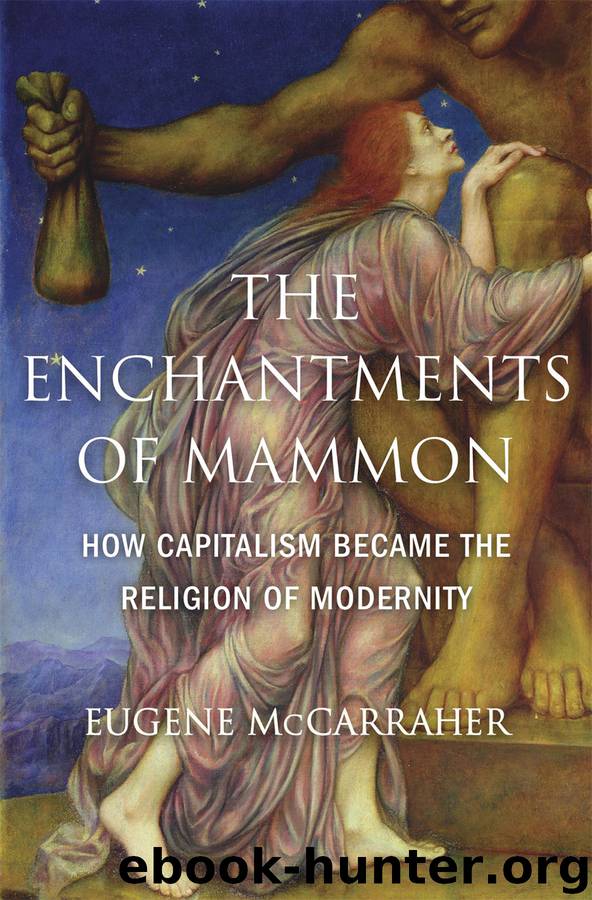The Enchantments of Mammon by Eugene McCarraher

Author:Eugene McCarraher
Language: eng
Format: epub
Publisher: Harvard University Press
PART SIX
Predicaments of Human Divinity: Critics of Fordist Enchantment, 1920–1945
OFTEN VILIFIED BY the pious as an insidious prophet of secular humanism, John Dewey was one of the last of the great liberal Protestant theologians. Since its inception in the early nineteenth century, liberal Protestantism had represented a tenuous halfway covenant with modernity: an acceptance of scientific hegemony; a repudiation of myths and miracles; and a benediction of “progress” through the advance of commerce, technology, science, and democracy. In the United States, the liberal Protestant accommodation with the Enlightenment anticipated the Progressive religiosity of Josiah Royce, Herbert Croly, and Walter Lippmann: the buoyant faith that social and technological advances were ushering in a modern communion. Like the first generation of Progressive intellectuals, Dewey believed that industrial culture bore the possibility of a spiritual life more expansive and fulfilling than previous religions, and in the 1920s and during the Great Depression, he sketched the rudiments of an alternative divinity. Just as Earnest Elmo Calkins and other corporate modernists were heralding a business millennium, Dewey proclaimed the advent of a beloved republic embedded in modern industry. As he wrote in The Public and Its Problems (1927), a “Great Community” was gestating in the apparently dehumanizing processes of mechanical civilization, a fellowship in which technology would be subordinate to democracy—“a name,” he wrote with religious flourish, for “free and enriching communion.”1
In the wake of the Great Depression, Dewey elaborated on the prospects of this impending Great Community. In Individualism Old and New (1930), he viewed “corporate society”—the interdependent complex of manufacturing and cultural industries—as the matrix of “a mental and moral ‘corporateness’ for which history holds no parallel.” This corporateness was building “a new type” of “mind and soul” and constructing what Dewey would soon call A Common Faith (1934). Blurring the traditional distinctions between sacred and secular, corporate society, Dewey thought, embodied “values that are religious in character”—cooperation, respect for individuality, and commitment to “inclusive, ideal ends”—that would only reach their fullest realization when liberated from the “money culture.” Beyond the pecuniary metaphysic lay, he asserted in Art as Experience (1933), “a world beyond this world which is nevertheless the deeper reality of the world in which we live.”2 Dewey’s common faith was a quasimystical augury of a corporate millennium.
The English journalist G. K. Chesterton had predicted a religious denouement for American industrialism. Reflecting on What I Saw in America (1922) during a lecture tour in the winter of 1921, Chesterton—like foreign visitors before him, from Tocqueville to H. G. Wells—was both charmed and appalled by the popular romance with money and business success. The American preoccupation with prosperity exemplified what Chesterton archly described as “a fine spirituality,” a belief that money and possessions were not worthy in themselves but rather markers of virtue. The typical American thought of goods as tokens, outward signs of victory in competition; the Yankee was a strange kind of “mystic” who thought of life as “a perpetual game of poker.” So while he admired the ubiquitous “hustle”
Download
This site does not store any files on its server. We only index and link to content provided by other sites. Please contact the content providers to delete copyright contents if any and email us, we'll remove relevant links or contents immediately.
International Integration of the Brazilian Economy by Elias C. Grivoyannis(57339)
The Radium Girls by Kate Moore(10910)
Turbulence by E. J. Noyes(7043)
Nudge - Improving Decisions about Health, Wealth, and Happiness by Thaler Sunstein(6636)
The Black Swan by Nassim Nicholas Taleb(6194)
Pioneering Portfolio Management by David F. Swensen(5608)
Rich Dad Poor Dad by Robert T. Kiyosaki(5151)
Zero to One by Peter Thiel(4828)
Man-made Catastrophes and Risk Information Concealment by Dmitry Chernov & Didier Sornette(4740)
Secrecy World by Jake Bernstein(3785)
Millionaire: The Philanderer, Gambler, and Duelist Who Invented Modern Finance by Janet Gleeson(3572)
Skin in the Game by Nassim Nicholas Taleb(3465)
The Age of Surveillance Capitalism by Shoshana Zuboff(3425)
The Money Culture by Michael Lewis(3286)
Skin in the Game: Hidden Asymmetries in Daily Life by Nassim Nicholas Taleb(3267)
Bullshit Jobs by David Graeber(3180)
The Dhandho Investor by Mohnish Pabrai(3170)
The Wisdom of Finance by Mihir Desai(3080)
Blockchain Basics by Daniel Drescher(2893)
